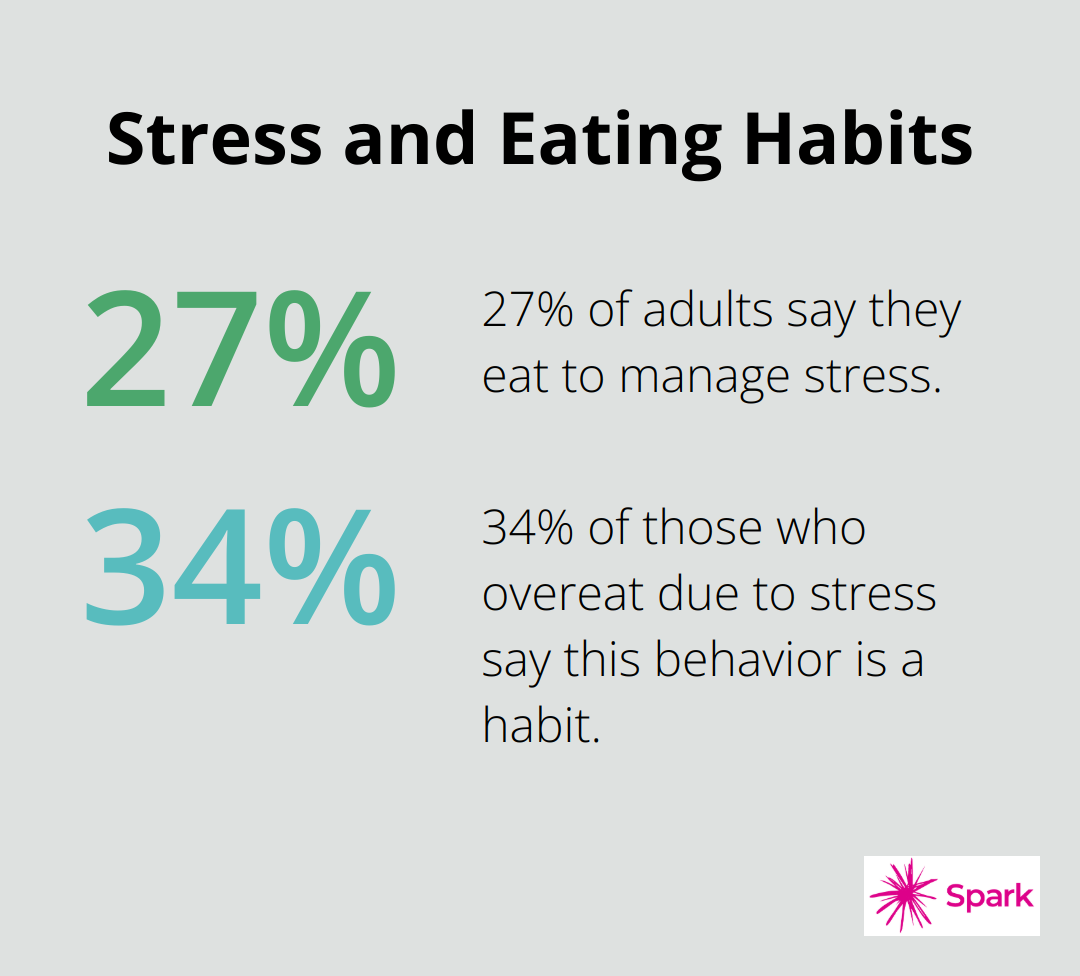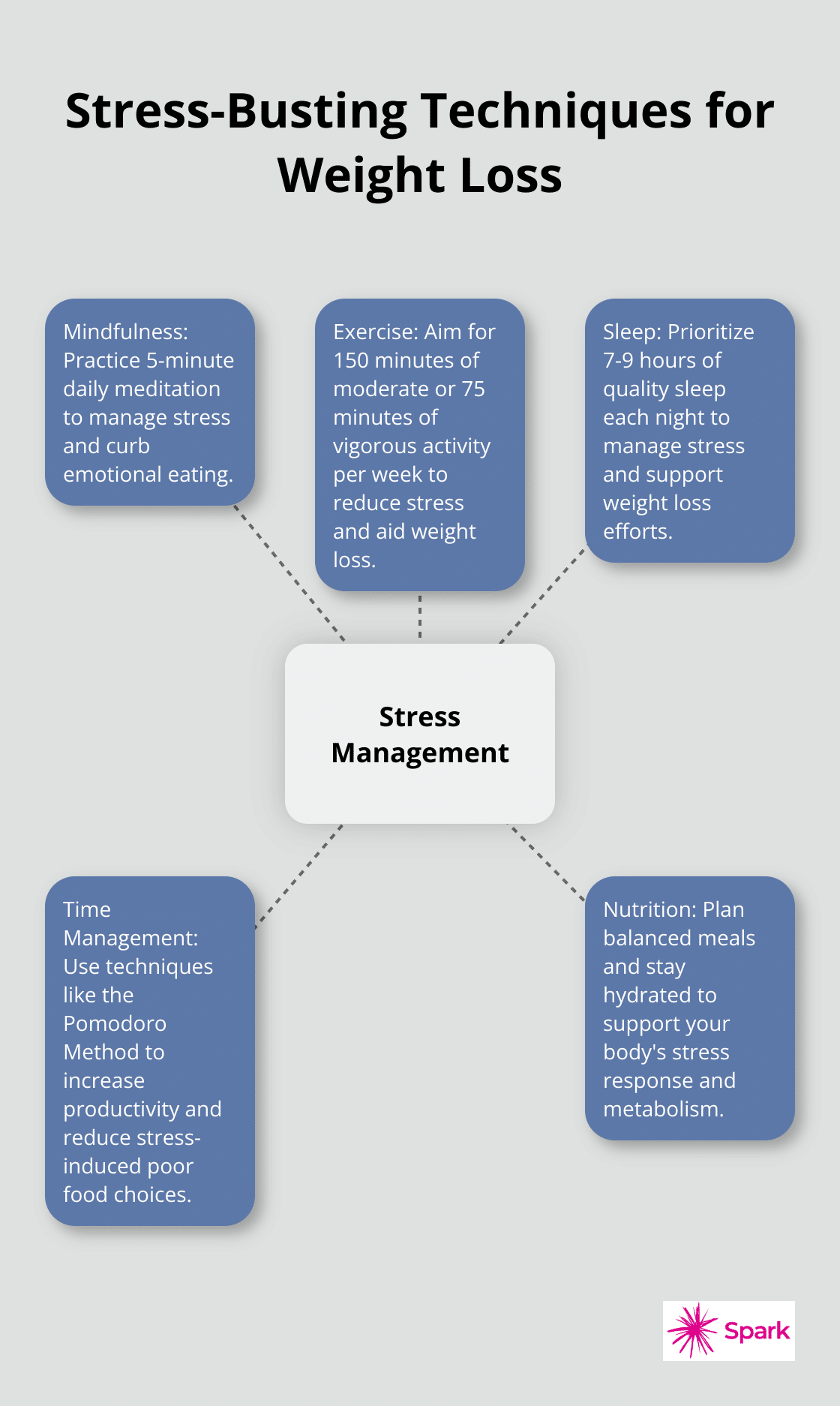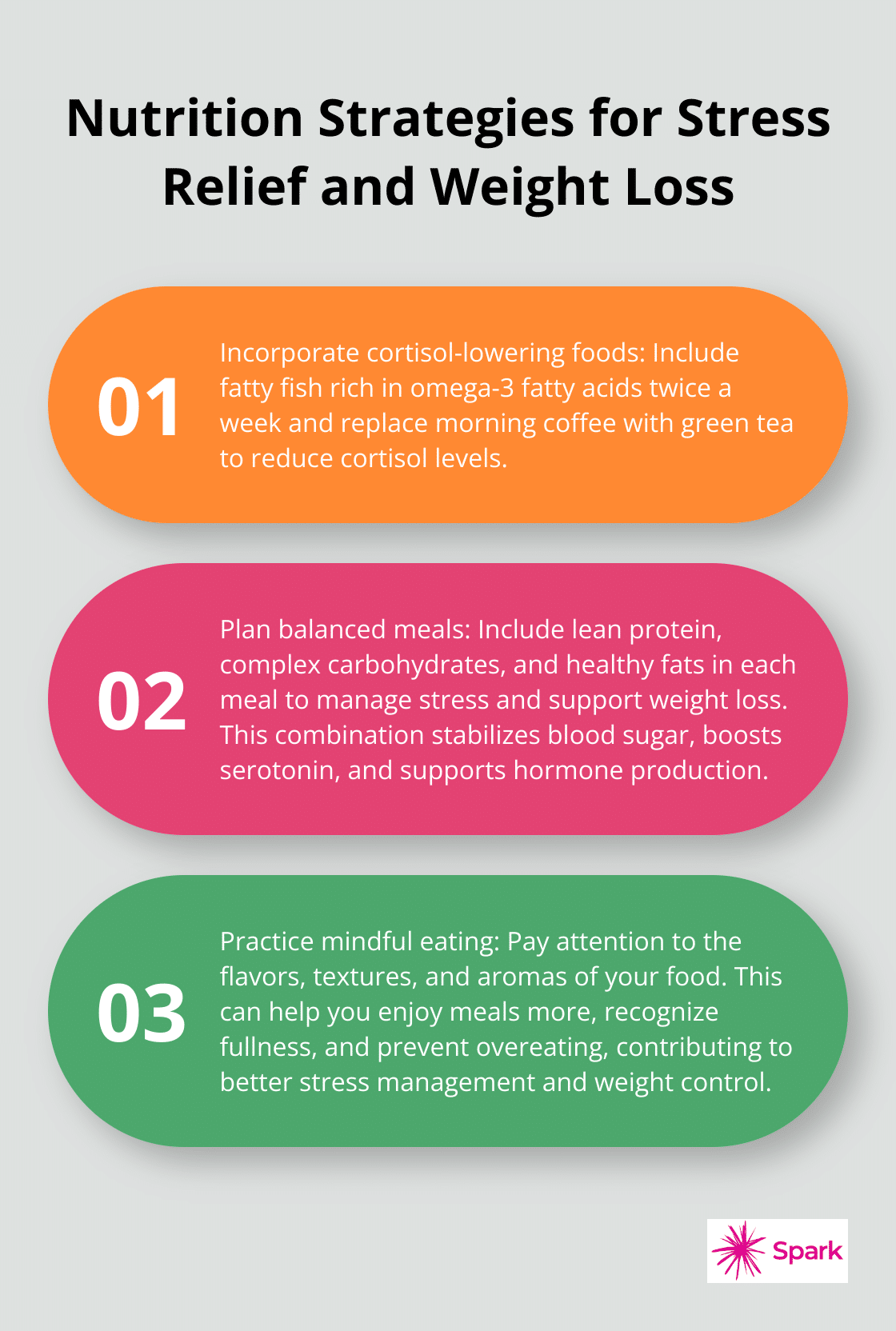At Spark Healthcare, we understand the complex relationship between stress and weight gain.
Stress management for weight loss is a critical aspect of achieving your health goals.
This blog post will explore how stress affects your body, eating habits, and weight, and provide practical strategies to manage stress effectively.
We’ll also share nutrition tips to help you combat stress-related weight gain and support your journey to a healthier you.
Why Stress Makes You Gain Weight
Stress acts as a silent saboteur of weight loss efforts. The link between stress and weight gain is strong and multifaceted. Let’s explore the reasons behind this connection.
The Cortisol Connection
When stress hits, your body releases cortisol, often called the “stress hormone”. Cortisol isn’t entirely negative – it helps you react quickly in emergencies. However, chronic stress keeps cortisol levels elevated, which disrupts your metabolism.
High cortisol levels increase appetite, especially for high-calorie comfort foods. Studies have shown that increased cortisol and self-reported stress promote weight gain and affect appetite.
Cortisol also promotes fat storage, particularly around your midsection. Researchers at Yale University found that even slender women with high cortisol had more abdominal fat.
Stress Eating: Beyond Willpower
Stress doesn’t just increase hunger – it alters what you crave. When stressed, your brain seeks quick energy from sugar and fat. This isn’t a lack of willpower; it’s biology at work.
A survey by the American Psychological Association found that 27% of adults say they eat to manage stress, and 34% of those who report overeating or eating unhealthy foods because of stress say this behavior is a habit.

Breaking the Emotional Eating Cycle
Emotional eating (using food to cope with feelings rather than hunger) is a common response to stress. It provides a temporary fix that often leads to guilt and more stress, creating a vicious cycle.
Identifying Triggers and Developing Strategies
To combat stress-related weight gain, it’s essential to identify your emotional eating triggers. Some common triggers include:
- Work pressure
- Financial worries
- Relationship issues
- Health concerns
Once you’ve identified your triggers, you can develop alternative coping strategies. These might include:
- Deep breathing exercises
- Calling a friend
- Going for a walk
- Practicing mindfulness
Understanding the stress-weight connection is the first step in breaking free from this cycle. Now that we’ve explored why stress leads to weight gain, let’s move on to practical stress management techniques that can support your weight loss journey.
Stress-Busting Techniques for Weight Loss Success
Mindfulness: Your Secret Weapon
Mindfulness is a powerful tool for managing stress and curbing emotional eating. A review describes the rationale for using mindfulness in interventions for weight loss and cardiovascular disease risk management.
Start with a simple 5-minute daily practice. Set a timer and focus on your breath. When your mind wanders (and it will), bring your attention back to your breathing. This small habit can make a big difference in how you respond to stress triggers.
Move Your Body, Calm Your Mind
Exercise is a potent stress-buster and weight loss aid. A study found that 33% of people report feeling less stress after exercise compared to 18% of those who had low stress levels to start.
Try 150 minutes of moderate aerobic activity or 75 minutes of vigorous activity per week. This could be a brisk 30-minute walk five days a week. The key is consistency-find an activity you enjoy and stick with it.

Sleep: The Unsung Hero of Weight Loss
Poor sleep triggers stress and can derail your weight loss efforts. A study in the American Journal of Clinical Nutrition found that sleep-deprived individuals consumed an average of 385 more calories per day.
Prioritize 7-9 hours of quality sleep each night. Create a relaxing bedtime routine, limit screen time before bed, and keep your bedroom cool and dark. These small changes can improve your stress levels and weight loss progress.
Master Your Time, Master Your Stress
Feeling overwhelmed by a never-ending to-do list can spike stress levels and lead to poor food choices. Time management is a vital skill for stress reduction and weight loss success.
Try the Pomodoro Technique: Work in focused 25-minute blocks, followed by 5-minute breaks. This method can increase productivity and reduce stress. Use your breaks for quick stress-relief activities like stretching or deep breathing.
Nutrition Strategies to Combat Stress
The food you eat plays a significant role in managing stress and supporting weight loss. Certain foods (like dark chocolate and fatty fish) can help reduce cortisol levels. Balanced meal planning is essential for stress management and weight loss.
Stay hydrated (aim for 8 glasses of water per day) to support your body’s stress response and metabolism. A well-hydrated body is better equipped to handle stress and maintain a healthy weight.
These stress management techniques work together to create a lifestyle that supports both your physical and mental health. The next section will explore specific nutrition strategies that complement these stress-busting techniques and further combat stress-related weight gain.
Eat Your Way to Stress Relief and Weight Loss
Cortisol-Lowering Foods
High-fat low-carbohydrate diets may enhance cortisol regeneration and reduce cortisol inactivation. Fatty fish (salmon, mackerel, and sardines) are rich in omega-3 fatty acids, which are linked to lower cortisol levels. Include these fish in your meals twice a week. Green tea contains L-theanine, an amino acid that can reduce cortisol levels. Replace your morning coffee with green tea for a calming start to your day.
Balanced Meals for Stress Management
Plan balanced meals to manage stress and support weight loss. Include a source of lean protein, complex carbohydrates, and healthy fats in each meal. Protein (chicken, turkey, fish, eggs, and legumes) stabilizes blood sugar levels and provides building blocks for mood-regulating neurotransmitters. Complex carbohydrates (whole grains, sweet potatoes, and quinoa) provide steady energy and boost serotonin production, which can calm your mind. Healthy fats (avocados, nuts, and olive oil) are essential for hormone production and can reduce inflammation in the body.

Hydration: A Key Player
Proper hydration is often overlooked in stress management and weight loss strategies. Even mild dehydration can increase cortisol levels and lead to fatigue and anxiety. Try to drink at least 8 glasses of water per day. If plain water bores you, infuse it with slices of lemon, cucumber, or berries for added flavor and nutrients. Herbal teas (chamomile and peppermint) can contribute to your daily fluid intake while providing additional stress-relieving benefits.
Mindful Eating Practices
Mindfulness-based approaches may prevent weight gain, but there is a lack of compelling evidence for their effectiveness in weight management. Pay attention to the flavors, textures, and aromas of your food. This practice can help you enjoy your meals more and recognize when you’re full, preventing overeating.
Meal Prep for Stress Reduction
Spending more time on meal preparation is significantly related to improved mental health and lower levels of stress. Set aside time each week to plan and prepare meals in advance. This practice ensures you have healthy options readily available, reducing the likelihood of stress-induced unhealthy food choices. Stock your kitchen with nutritious snacks (such as cut vegetables, fruits, and nuts) for easy access during busy or stressful times.
Final Thoughts
Stress management for weight loss requires a holistic approach. Chronic stress disrupts metabolism, promotes fat storage, and alters food preferences, creating a challenging cycle for those trying to lose weight. Effective stress management techniques, including mindfulness, exercise, quality sleep, and time management, can break this cycle and support healthy weight loss.
Nutrition plays a vital role in stress management and weight loss. Cortisol-lowering foods, balanced meals, proper hydration, and mindful eating significantly impact stress levels and weight management efforts. These strategies contribute to overall well-being and long-term success in weight loss journeys.
We at Spark Healthcare offer personalized, evidence-based telepsychiatry services to support your mental health needs. Our approach includes individualized care plans, medication management, and cognitive-behavioral therapy (all accessible from home). Start small, be consistent, and celebrate your progress as you work towards your weight loss goals while improving your overall quality of life.






